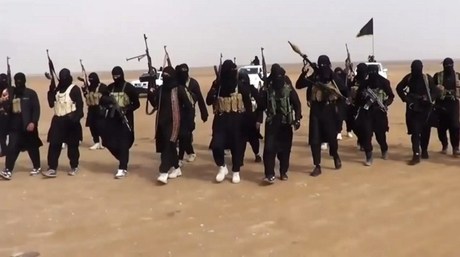Spy Chief: 15 Australian Fighters Killed in Iraq, Syria
إقرأ هذا الخبر بالعربية
Fifteen Australians, including two young suicide bombers, are believed to have died fighting in Syria and Iraq, intelligence chief David Irvine said Wednesday, warning that espionage and foreign intervention threats were increasing.
Canberra has expressed alarm that around 60 Australians have joined violent jihadist groups such as Islamic State (IS) overseas.
One Islamic State fighter, Australian man Khaled Sharrouf, sparked outrage when an image of his Sydney-raised son posing with the rotting head of a Syrian soldier was reportedly posted on Twitter.
"The draw of foreign fighters to Syria and Iraq is significant and includes more Australians than any other previous extremist conflicts put together," Irvine said.
He said the Australian Security Intelligence Organisation (ASIO) believed the number of citizens posing a potential security threat had increased substantially as a result.
"ASIO believes there are about 60 or so Australians fighting with the two principal extremist al-Qaida derivatives, Jahabat-al-Nusra and the Islamic State in Syria or Iraq," Irvine said.
"We believe 15 Australians have already been killed in the current conflicts, including two young Australian suicide bombers."
Irvine said 100 more people in Australia were "actively supporting" these extremist groups by recruiting new fighters, grooming suicide bombing candidates, and providing funds and equipment.
Australia has boosted its efforts to counter terrorism on fears that the bloody conflicts in Iraq and Syria are creating a new generation of militants, including increasing spending on security and intelligence and strengthening terror laws.
Irvine said intelligence agencies were concerned about the dangers posed when some of these people -- potentially with a commitment to violence and training in the use of weapons or bomb-making -- returned to Australia.
He also warned that the age-old threats of espionage and foreign interference were on the rise against Australia.
"I can say that we are seeing growth in espionage and foreign interference against Australia, both through cyber and more traditional methods," he said.
"Further, the threat to government information from self motivated malicious insiders has increased."
Asked about the killing of United States journalist James Foley, beheaded on a graphic video posted online last week, Irvine said he had no view on whether media outlets should have shown the footage.
But he added: "It has, whether you liked it or not... brought home to us an understanding of the nature of what we are dealing with."



